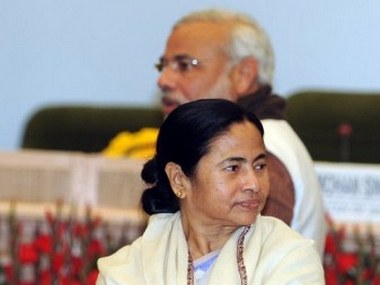One of the big side-effects of having unpredictable or polarising political characters like Mamata Banerjee, Mayawati, Narendra Modi or Jayalalithaa is that they can single-handedly turn the course of events. For better or worse. Mamata’s sudden foray into a presidential election forced Sonia Gandhi to abandon her ambivalence towards Pranab Mukherjee and make him the party’s No 1 choice (Read here ). It also helped preserve Manmohan Singh’s hold on the PM’s gaddi and may yet allow him to run the finance ministry like his own. But who knows, with Sonia Gandhi donning an active political mantle, it could mean curtains for him too at some point. The firebrand Trinamool leader’s one-day alliance with Mulayam Singh ended up cementing his relationship with Congress. We don’t know the actual deal which helped him abandon Mamata (maybe he always intended to ditch her, but we can’t know that); it is likely that he gets primacy in Uttar Pradesh at the Congress’ cost. [caption id=“attachment_346250” align=“alignleft” width=“380” caption=“Unwittingly, Mamata has changed the politics of India. Inevitably, Modi, too, will do the same. The law of unintended consequences has been set in motion. Raveendran/AFP”]  [/caption] Mulayam’s cosying up to the Congress forced Mayawati’s hand – she rushed to endorse Mukherjee’s candidacy merely to show up Mulayam as a wayward character who may swing this way or that. Mamata’s failed gambit also reduced three other players to also-rans in terms of clout and influence. The BJP is now reduced to backing Pranab Mukherjee (someone it opposed vehemently last month). As for Purno Sangma’s candidature, it is clear that his “tribal” cause, championed by Jayalalithaa and Naveen Patnaik, is a lost one. Both Jaya and Patnaik have been left sucking their thumbs. The Bengal tigress has done Sonia Gandhi another favour inadvertently: she has managed to loosen the BJP-Janata Dal (U) alliance in Bihar — an alliance already in some trouble due to the possibility of Narendra Modi taking centre-stage in the BJP. When the BJP opposed Hamid Ansari in May, the JD(U) demurred, saying it was not consulted. It had no objections to Ansari. Thanks to the Modi factor, the JD(U) has been less than willing to toe the BJP line on who to back for president, and this could mean that JD(U)’s alliance options for 2014 — or even earlier — may be open for the Congress to exploit. Even though Lalu Prasad of the RJD has been a staunch ally of the Congress, there is no gainsaying the fact that Nitish is the one with the upper hand in Bihar. The more the BJP opts for Modi, the more Nitish is likely to dump the state-level alliance to go for it alone or even take on another junior partner. As for Mamata herself, it is more than likely that unless she is willing to eat crow, she will have to part ways with the Congress in West Bengal. Worse, she may have made the Left Front relevant again – both in state politics and at the Centre. Sonia Gandhi was always comfortable with the Left, which always treated her with respect even while opposing Manmohan Singh as neo-liberal. But for the PM’s dislike of the Left, she would not have allowed the UPA-1 alliance to fall apart in 2008. She would have been happier dumping the nuclear deal than the Left. But with Mamata playing spoilsport in UPA-2, Sonia could well be willing to have another dalliance with the Left – especially after 2014, if she is short of a clear majority. Her instincts, and those of the Congress, are largely socialist, something the Left could live with. Single-handedly, without quite intending it, Mamata has created new possibilities for pre- or post-2014 political alliances. But in a short while, she could be joined by Narendra Modi as the person who could drive new political equations everywhere. Modi’s arrival on the national scene may also have unintended consequences like energising the Congress, which now has to perform or perish. Unlike the lightweight group previously running the BJP in a confused leadership set-up, Modi is not someone the Congress will take lightly. Since Modi is likely to both repel and recharge the BJP’s political base, both in Gujarat and in other states, the Congress can benefit only if it starts playing the new game with the active involvement of Sonia Gandhi. This is what may be happening, as revealed in the presidential elections. Faced with the Mamata challenge, Sonia emerged from purdah to deliver a counter-punch. If this continues, Congress will be a renewed political force — though there are question-marks over Sonia’s health. Given the possibility of strong regional challengers everywhere, Sonia probably realises that in many states she will have to deal with powerful regional parties — from UP to Bihar to Orissa and Andhra (as Jagan Mohan Reddy’s recent byelection victories show). These potential rivals-cum-allies can only be handled by the Congress high command. They will not deal with the Manmohan Singhs (or even Rahuls) of the world even if they happen to be PM. Unwittingly, Mamata has changed the politics of India. Inevitably, Modi, too, will do the same. The law of unintended consequences has been set in motion.
Some politicians have the power to set off massive political changes without quite intending to.
Advertisement
End of Article
Written by R Jagannathan
R Jagannathan is the Editor-in-Chief of Firstpost. see more


)
)
)
)
)
)
)
)
)



